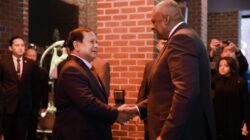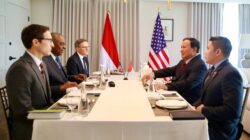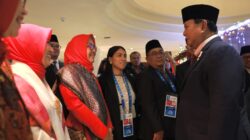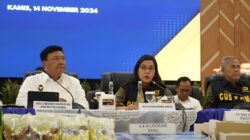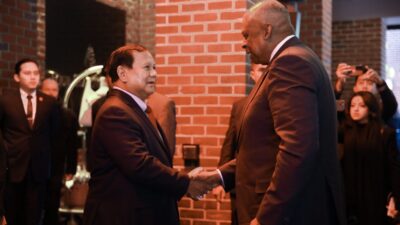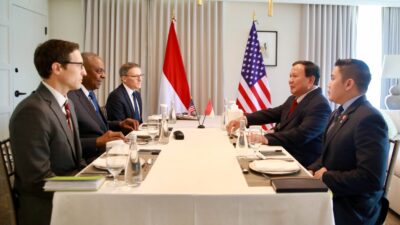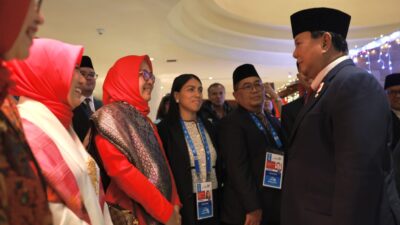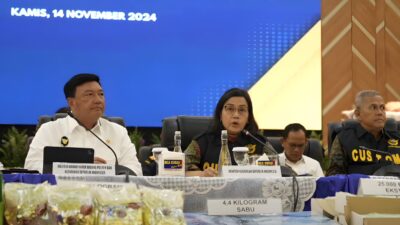By: Prabowo Subianto [excerpted from “Nation’s Transformation Strategy: Toward a Golden Indonesia 2045”, pages 125-128, 4th softcover edition]
Joining President Joko Widodo’s Indonesia Maju Cabinet in October 2019 gave me a firsthand opportunity to observe and work directly with President Jokowi.
My four-year experience working with President Jokowi has led me to conclude that his policies are indeed an implementation of the Pancasila Economic philosophy.
Take, for example, the social safety net. President Jokowi places a high priority on this, conducting weekly checks in the field to ensure government agencies are assisting the poorest and most vulnerable members of society.
I’ve seen President Jokowi’s schedule, and there’s hardly a week he doesn’t visit markets and communities to ensure staple food prices are stable and government programs are effectively easing the people’s burden.
During President Jokowi’s term, the government introduced the Indonesia Health Card, covering BPJS premiums for 96 million underprivileged citizens. With a total of 248 million BPJS participants, this might be the largest universal health coverage program in the world.
In 2022 alone, thanks to the Indonesia Health Card, our healthcare facilities, including hospitals and community health centers, provided over 236 million free visits. Now, people with modest incomes, or those without steady earnings, don’t have to fear the cost of seeing a doctor when sick.
The government also launched the Indonesia Smart Card and Indonesia Smart Card for College. These programs bolster the provision of free education at the elementary and middle school levels nationwide, as well as free high school education in several provinces and districts.
With the Indonesia Smart Card, over 17 million students and 2 million religious school students receive support for their schooling needs. It enables children from both poor and affluent families to attend school in the same uniform and with the same school supplies, narrowing the economic gap.
President Jokowi also introduced the Staple Food Card and the Family Hope Program. The most economically vulnerable are helped with direct rice deliveries to their homes. Families in need receive direct cash assistance (BLT).
If President Jokowi’s economic policy wasn’t Pancasila Economy, social safety net programs like these wouldn’t exist. The government would remain passive, asking everyone to fend for themselves. But that’s not the case. Under President Jokowi’s leadership, the government steps in to assist those in need.
Additionally, President Jokowi routinely ensures that downstreaming and industrialization progress smoothly. He personally checks on smelter constructions, processing plant developments, and the prohibition of raw material exports.
President Jokowi also bravely faces demands at the World Trade Organization (WTO) for Indonesia to allow raw material exports. He has even said, let them sue us; we will appeal and continue to fight for the interests of the Indonesian people.
President Jokowi’s policy to ban raw nickel exports was followed by bans on bauxite, copper, and tin exports. These materials are globally needed for steel production, batteries, electric vehicles, and various electronics.
We’ve allowed our natural resources to be exported raw for too long, letting other countries enjoy the added value. However, processing these resources domestically could create many high-quality jobs. State revenue would also increase from taxes, royalties, and non-tax revenues.
President Jokowi’s courage to ban the export of raw materials aligns with Article 33 of the 1945 Constitution. As I mentioned earlier:
Paragraph 3, “The land, the waters, and the natural resources contained within are controlled by the state and utilized for the greatest prosperity of the people.”
This isn’t just what President Jokowi wants. It’s a mandate of our Constitution, consistently implemented by President Jokowi.
Therefore, the economic policies under President Jokowi, which I refer to as “Jokowinomics,” are actually the enactment of Pancasila Economy. We must continue this approach consistently for Indonesia to become an advanced and prosperous country.


